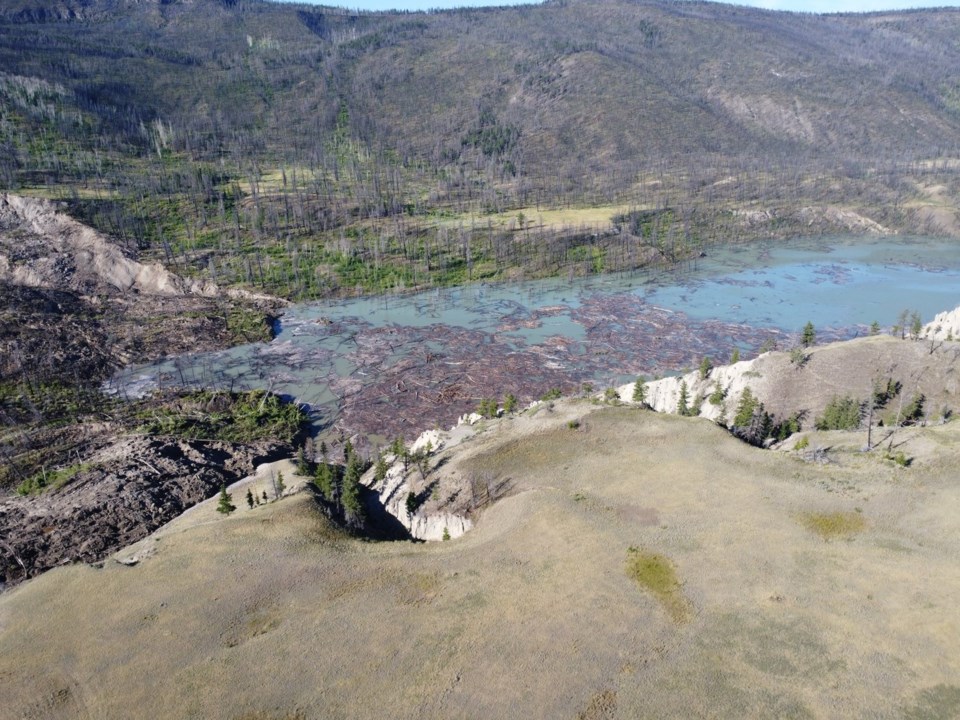VANCOUVER — A "grateful" emergency management minister says the threat of a flood disaster along British Columbia's Chilcotin and Fraser rivers appears to have been averted when a massive lake drained overtop of a landslide.
Bowinn Ma said high waters similar to spring runoff conditions are being observed downstream along the Chilcotin and Fraser rivers, but dangers still exist from the powerful current carrying trees and other debris. while carving away large sections of landscape.
"The risk of a worst-case scenario has drastically decreased, but we are not in the clear yet," she said Tuesday at a news conference. "I am extremely grateful the worst-case scenario did not come to be."
The landslide last week at Farwell Canyon located about 22 kilometres south of Williams Lake dammed the Chilcotin River and created a lake about 11 kilometres long behind the slide.
Water started flowing over and through the debris site Monday, cutting about a 15 metre channel through the dam, and then it began widening with water flows increasing by the hour.
The water was expected to flow past the Fraser Canyon communities of Lytton and Boston Bar Tuesday evening, reaching Hope, located about 150 kilometres east of Vancouver, by early Wednesday, said Ma.
"We aren't in the clear of the woods yet," she said. "We still have a few hours left for the water to drain from behind the dam and then we need to take the time to assess how the landscape faired following that event."
The minister said people need to stay away from the slide and potential flood areas due to the risk of slopes failing and being swept away by the water.
Indigenous leader Joe Alphonse, whose nation depends on the salmon in the river, said Tuesday he's "relieved" the dam created by the landslide broke and "we hope and pray that it's not going to cause too much damage to property and people downstream from us."
At least one heritage cabin was washed away from the banks of the raging Chilcotin River when the water started to flow over the top of the landslide area on Monday, said Alphonse, the Tsilhqot'in National Government tribal chair.
"You can't manipulate Mother Nature," he said at a news conference. "We need to continue to monitor the river. There's a lot of work that needs to happen here."
Alphonse said the slide and damage from the rushing water could impact critical salmon runs heading for spawning areas upstream on the Chilcotin River and at Chilko Lake.
He said the valuable sockeye salmon run, currently making its way up the Fraser River, is due to arrive at the Chilcotin River this weekend, while some Chinook have passed by the slide area, but others are still in the river downstream from the slide.
"We need wild stock," Alphonse said. "We have always eaten wild salmon, wild moose and wild deer. We are dependent on wild stock salmon. When you live at the poverty line you can't afford to buy food from the health food store."
He called on the Fisheries Department to introduce "automatic" sport and commercial fishing restrictions to protect Chilcotin River and Chilko Lake salmon.
"The (Tsilhqot'in National Government) is also calling on all levels of government, downstream First Nations, the Pacific Salmon Commission, and other nations and states, especially Alaskan fisheries, to take all precautionary measures possible to conserve Tŝilhqot’in territory-bound salmon, and to immediately cease from fisheries that may impact these stocks, until the impacts from the landslide and breach are fully understood," said a Tsilhqot'in statement Tuesday.
"We don't want to hear excuses for the Chilko Lake run. We want leadership and solutions," Alphonse said during a news conference.
The Fisheries Department said in a statement Tuesday that based on historical timing, it believes the majority of adult chinook salmon returning to the Chilcotin River this season migrated past the slide site before last week's landslide.
It also said the majority of adult sockeye salmon are expected to arrive at the confluence of the Chilcotin and Fraser Rivers around the third week in August, and coho not until the early fall.
Alphonse said the government did not make enough effort to work with the Tsilhqot'in on monitoring the landslide situation, choosing instead to "strike fear into everyone. We don't need them in our territory as far as I'm concerned. The next go around we'll tell them to stay out."
Ma said the province's approach to the landslide involved hoping for the best and preparing for the worst.
"What we did is what British Columbians would have expected us to do," she said. "We mobilized the resources we needed in order to gain a thorough understanding of the landslide situation and modelled out scenarios and prepared for scenarios that ranged from the worst-case scenarios to a hopeful or more best case scenario.
This report by The Canadian Press was first published August 6, 2024
The Canadian Press




